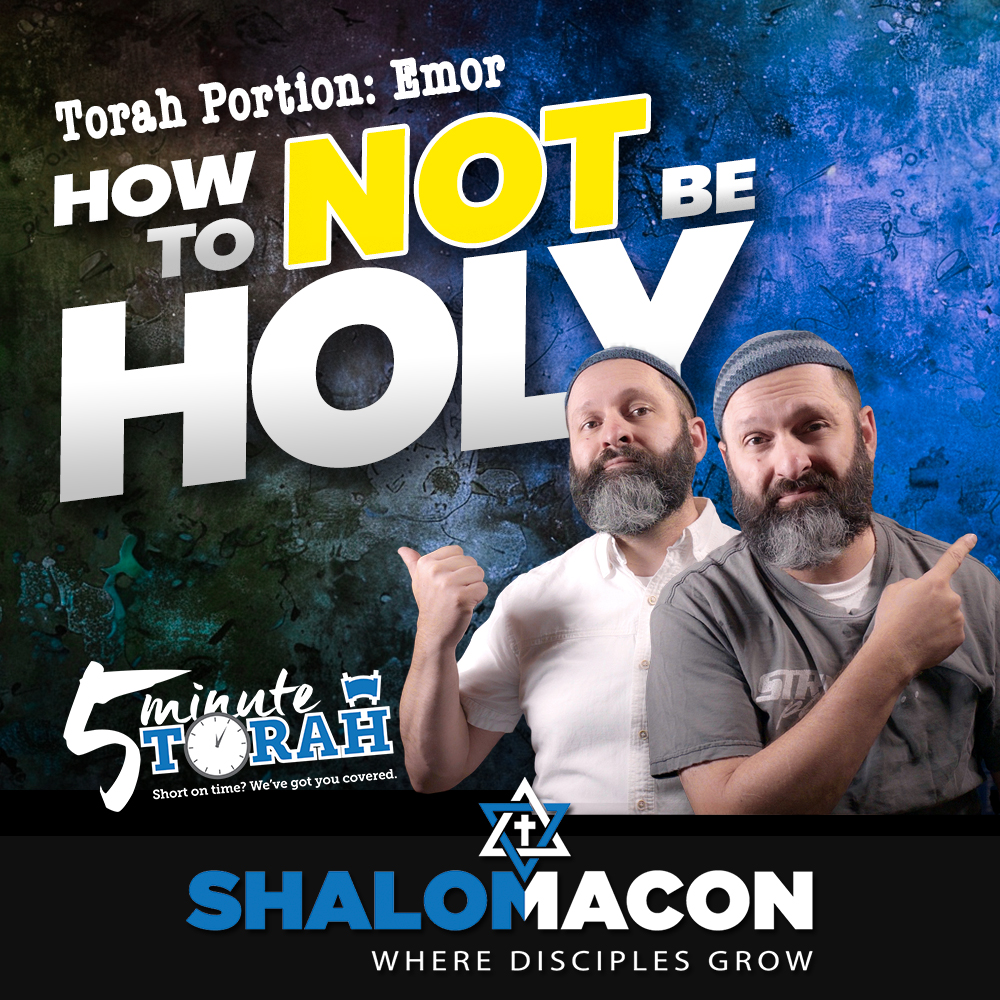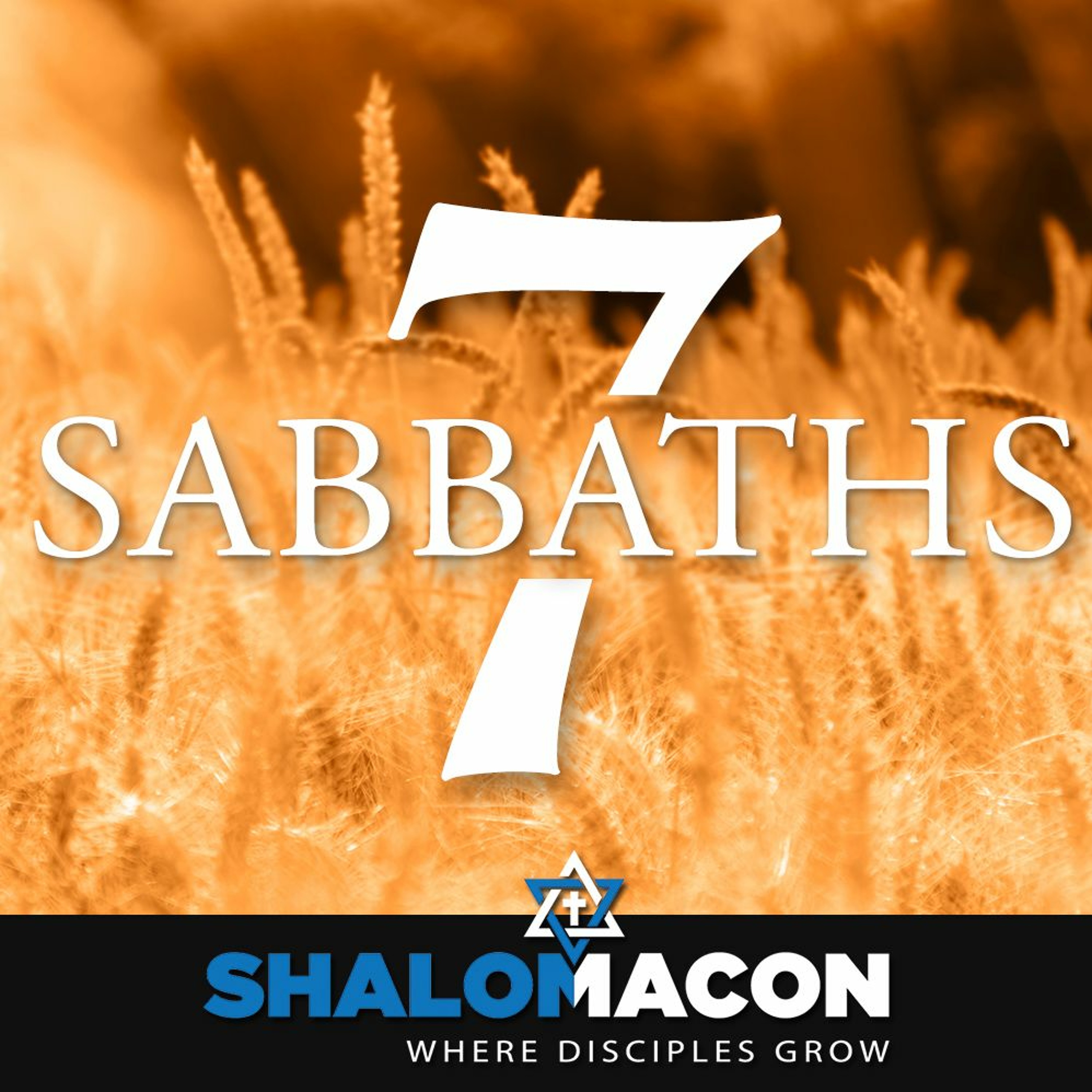[00:00:00] Speaker A: Hey, guys. Hey. Sorry, I just woke up and I remembered I need to shoot this video. So pardon the appearance here. After all, God doesn't judge the appearance, right. He judges the heart. Like right now, my heart wants to go back to bed.
But anyway, we'll just see how this goes, okay? I'll see you in a few minutes. For this week's five minute tour.
Welcome back, Shalomis. Welcome to another episode of five minute Torah. Before we get into the actual five minutes or so of the five minute Torah, here's a brief overview of this week's Torah reading. This week we're studying the portion of Imor Leviticus 211-2423 and here are the three things that you need to know about it. Number one, extreme holiness the life of the Kohen. The Torah portion, Amor, places a strong emphasis on the concept of priestly holiness, setting forth specific regulations that the priest, the kohanim, must follow through to maintain their ritual purity and suitability for service in the tabernacle and then later the temple. These regulations encompass both physical and ritual aspects, highlighting the priests unique role as an intermediary between God and Israel. Priests are prohibited from contact with dead bodies except for their closest relatives to avoid ritual purity. They also face restrictions in marital choices, only allowing them to marry women who meet certain standards of purity. Additionally, priests with physical deformities are excluded from performing certain sacred rituals, although they are still able to share in the priestly food. These stringent requirements highlight the broader theme of holiness and separation from worldly defilements, ensuring that those who serve directly in gods presence exemplify the utmost sanctity, reflecting divine holiness to the community in which they lead. Number two, blasphemy and its severe consequences in our current Torah portion, the topic of blasphemy and its punishment is addressed through a specific incident involving a man who blasphemes the name of God. This episode highlights the seriousness that blasphemy holds in gods eyes. The narrative recounts how the blasphemer, the son of an israelite woman and an egyptian man, curses gods name during a fight hes brought before Moses, and God commands that the entire community must stone him to death. This severe punishment reflects the sanctity of gods name and the grave nature of disrespecting it. It serves as a powerful deterrent, illustrating the broader principle that words have profound power and that we should uphold the holiness of God's name at all times. This incident, along with its consequences, emphasizes the importance that revere for God and his name should have among his people. Number three festivals the go to chapter if you're looking for details on one of the biblical festivals, Leviticus 23 is the address. This entire chapter is focused on spelling out the biblical calendar and festival cycle, beginning with the weekly Sabbath, which serves as a regular reminder of creation and ceasing from our own labors. This Torah portion also outlines the major annual festivals, pesach, or Passover, commemorating the exodus from Egypt Shavuot, the feast of weeks celebrating the giving of the Torah at Sinai and Sukkot, the feast of tabernacles remembering the Israelites wilderness journey. It also details the observance of Rosh Hashanah, civil New Year, Yom Kippur, the day of atonement, and other sacred assemblies. Each festival involves specific rituals, offerings, and prohibitions reflecting the holiness and unique aspects of each one. Through these observances, the Torah emphasizes the sanctification of time and creates a rhythm of worship and remembrance that shapes the lives of the people of God. If you're looking for a place to learn, connect, and grow, then Shalom Macon is the place. It doesn't matter where you are in the world. You can find a connection with Shalom Macon through our live services every Saturday and through our private social network we call Shalom at home. Check us out on YouTube and on our
[email protected] for more information. We look forward to connecting with you and seeing you this Shabbat. This week's tour commentary is called offering our best and comes from my book five minute Torah, volume two.
The Torah portion of amorah is a continuation of our last Torah portion of Kedoshin in that it also outlines the parameters of holiness, but this time the guidelines are for the priestly service. Chapter 22 details the laws pertaining to voluntary offerings. In this section we have a few interesting laws describing restrictions for these sacrifices, and although these restrictions are specifically in regard to voluntary or free will offerings, the principles are applied to any and all offerings. The first principle is that an unfit animal may not be used as a sacrifice. Though understood in theory, this principle is often lost in a modern context since we do not have a functioning bait or tabernacle or temple. Lets explore this. During the time the holy temple functioned, the supplicant was required to bring the very best of his herd or flock as his offering. He couldnt bring a blemished animal. If it is to be accepted for you, it shall be a male without blemish of the bulls, or of the sheep or the goats. You shall not offer anything that has a blemish for it will not be acceptable for you. And when anyone offers a sacrifice of peace offerings to the Lord to fulfill a vow or as a free will offering from the herd or from the flock to be accepted, it must be perfect. There shall be no blemish in it. Leviticus 20 219 21 in order for an offering to be acceptable to the Lord, it must not be blind, have a broken bone, a split eyelid, warts, sores, a limb that is too short or too long, or a disorder that causes its hooves to not be completely split, etcetera. It had to be free of any kind of blemish. This may not seem like a big deal, but from an economic standpoint this can appear counterproductive. This meant giving up the most healthy, the most valuable, and the potentially the most expensive animal of the herd or flock. How can we relate to this? Today we can view our observance of the commandments, particularly of our celebration of the festivals, in much the same manner. Just as these voluntary offerings are a gift to the Lord, so too are our observances of the festivals, because each festival is an appointment with them. Here are some questions to ask when it comes to how we celebrate the festivals. Do we observe gods appointed times, including Shabbat, to the very best of our ability, or do we just do the minimum to get by? Is our table set with the very best we have, or does it look like the rest of the week? Do we purchase and enjoy the very best foods that we can afford, or do our meals look like the other six days of the week? Do we wear our very best clothes, or are we still in our shorts and t shirts? Do we celebrate the festivals with detail, precision, and completeness, or do they look like most other days? 1 may object. The Sabbath is a day of rest and leisure. It should be casual and relaxed. But is that the true spirit of the Sabbath? Is this the gift we desire to give back to our maker? Both of these situations, offering a sacrifice in the holy or celebrating a festival in our home, come down to the question of whether or not we have made them holy by offering up our best. The final question is, have we given our absolute best offering to the Lord, or are we merely handing him the leftovers? Just as we wouldn't want to give him an unfit animal as an offering, we shouldn't settle for giving him our second or third best on a day of holiness. Maybe youve been in the habit of keeping the more casual Shabbat or making the festivals casual. Ask yourself, what can I do to enhance both the beauty and the sanctity of the upcoming Sabbath or festival. What will my next offering to the Lord look like? Honestly? Have you been giving your best or giving whats comfortable? Do Shabbat in the festival simply look like the other days of the week for you? If so, are you willing to put in the extra effort to make a change and kick it up a notch? Let me know in the comments below. And if you haven't started the parakea vote study, it's not too late. You can join it right now. Just use the link here above or at the end of this video to get started. I'll see you next week for another messianic insight into the eternal Torah of God. Blessings from Shalom Macon, the place where disciples of Yeshua Learn, connect, and grow.
[00:08:53] Speaker B: Please visit our website, shalommaken.org, to learn more about us. Join our live services, access other teachings, sign up for our newsletter, join our private network that will connect you with our greater community from around the world, or contribute to the work of Shalom Macon. Thank you for watching and we look forward to connecting with.



